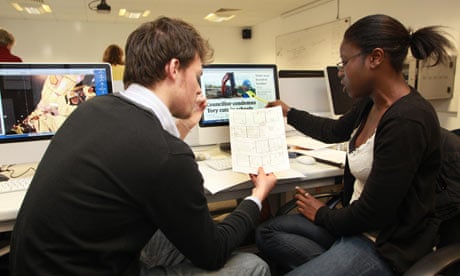"We've got one hour to finish subbing, guys," shouts someone from the backbench. "You're joking," exhales a sub with all the despair of an aged hack.
Despair would be an understandable emotion for those hoping to forge a career in journalism during the current gloom but it is wholly lacking in the newsroom at Goldsmiths, University of London. Jumping between Macs and shuffling shorthand notebooks, 18 postgraduates are putting together the latest edition of a new magazine, an internet startup they have launched for the disparate London boroughs that will be linked by the East London overground railway, which reopens in a massively extended form in 2010.
The magazine, EastLondonLines, is a riposte to despair and also the growing opinion that British journalism courses leave students lacking the entrepreneurial skills needed to survive in a world where media organisations are struggling to make content pay. Here, Goldsmiths' MA journalism students have been put in charge of their own startup: they are hoping to build an audience from scratch, market it, make it attractive to advertisers and make contact with those potential sources of revenue.
The brainchild of Angela Phillips, a senior lecturer, ELL is an independent, news-led website, complete with listings, features, video, audio and tweets for everyone using the new railway line. This not-for-profit company is a valuable learning tool but the students also hope to raise enough money from local advertisers to provide a few of them with their first paid jobs in journalism next summer – working short-term contracts as reporters and editors for ELL until they can hand the social enterprise over to next year's intake. While an ex-Goldsmiths student with marketing experience is helping with the advertising effort, the students want to do a lot themselves: they plan to hand out promotional ELL flyers to commuters when the railway reopens.
Initial signs are promising. Tweeting is driving traffic to the site, and they are breaking stories: the Guardian, the Evening Standard and the Hackney Gazette have all followed them up. One student, Gary Cansell, went along to the unpromising-sounding Lewisham Group Police Consultative Group and discovered an officer from the Met's anti-gun crime unit, Operation Trident, was planning to visit primary schools. His story went national, earning Scotland Yard's ire.
As Phillips points out, the startup has thrown 18 eager journalists into the courts and local council meetings of south and east London, a reporting commitment some local papers would struggle to match. The students are learning not just traditional local reporting but also useful digital skills: publishing using Wordpress, exploiting Twitter, reciprocal linking, how to search for local stories online through Google Reader and Yahoo Pipes (using metasearches to pick out relevant stories) and monitoring the (rising) traffic with Google Analytics.
Crucial to the success of ELL will be how it builds its audience and attracts advertising. Like any conscientious journalism tutor, Phillips constantly stresses to students the importance of retaining editorial independence and hopes to fund ELL with a wide range of small advertisers rather than relying on one or two big funders.
The blogger and Guardian columnist Jeff Jarvis has kicked off a growing debate about the lack of entrepreneurial training for student journalists. Phillips argues Goldsmiths is doing this practically through ELL, although she admits their startup would not have been possible had her course been NCTJ-accredited. "They want to micromanage the curriculum," she says.
Birmingham City University has launched MAs in online and freelance journalism which emphasise entrepreneurship, while Newcastle University is also adding entrepreneurial training to its journalism school next year.
Roy Greenslade, professor of journalism at City University, thinks lamenting the absence of entrepreneurial thinking in UK journalism courses is a fair criticism. There has long been a "steel wall" between journalism and what journalists have traditionally seen as "the mucky business of commerce", he says. "We find it very difficult as journalists to transform ourselves into people who also seek revenue."
Greenslade mentions entrepreneurial bloggers such as Rick Waghorn of myfootballwriter.com in his lectures but it would obstruct his teaching to "try and make businesspeople out of my journalists", he argues. "More seriously, we are constantly trying to find new business models and this has been particularly true in the US where there have been some terrific innovations such as Spot.us [which "crowd funds" specific investigations by appealing for reader donations]."
Greeenslade sees an entrepreneurial instinct among his students, who have set up startups including Brighton-based journalism.co.uk. Its senior reporter, Judith Townend, 26, graduated from City in 2007.
Before the recession struck, student journalists did not really see the benefits of blogging, she says. "When I go back and meet the City students, they are thinking completely differently. Students have had to wake up a bit and have more of an entrepreneurial hat on. It doesn't have to be selling out and moving into advertorial. For young journalists there are more opportunities than ever. When I was getting into it we were fighting to get bylines on a paper, but now blogs have taken off and we've immediately got a platform with Twitter and if your stuff is good it will get picked up."
The economic outlook may be gloomy for traditional media but the students' drive is infectious in the newsroom at Goldsmiths. Ultimately, says Laurie Whitwell, 22, they know that if their startup attracts an audience and advertising, they will raise enough money to create their first jobs in journalism for themselves next summer. "That's the big inspiration. With media jobs being cut, we are aiming to do it ourselves – to make a living from our journalism."
